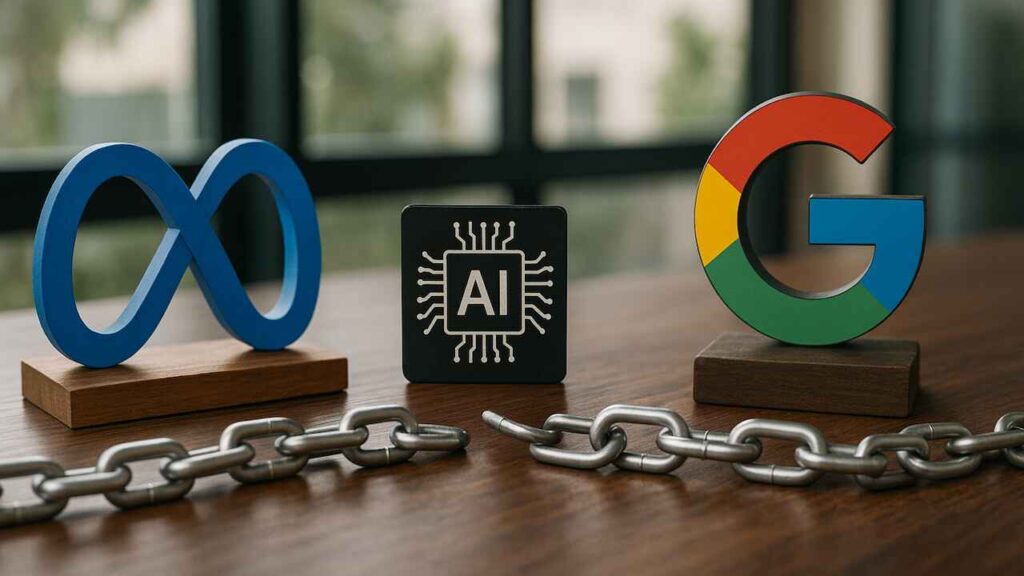Meta just made a massive $14.3 billion bet on the future of artificial intelligence, and it could upend everything from Big Tech rivalries to the future of AI research itself. The company has acquired a 49% non-voting stake in Scale AI and recruited the company’s 28-year-old CEO, Alexandr Wang, to lead its new Superintelligence lab.

Meta Just Dropped $14 Billion—Google’s Urgent AI Pivot
| Insight | Why It Matters |
|---|---|
| Meta takes 49% stake in Scale AI | Gains premium access to labeled data fueling AI advancements |
| Scale AI CEO joins Meta | Signals aggressive push toward AGI development |
| Google ditches Scale AI | Competitors fear data access risks |
| Rival AI data firms booming | Handshake and Appen see demand surge |
Meta didn’t just buy into Scale AI—it positioned itself at the heart of the data war driving the next decade of artificial intelligence. While Google and others scramble to rewire their pipelines, Meta now controls a critical piece of the superintelligence puzzle. This isn’t just an investment. It’s a strategic land grab in the age of AI.
Inside the Deal
Meta’s June 12 investment lands just shy of a full acquisition but still gives it sweeping influence over Scale’s data infrastructure. This non-voting stake allows Meta to sidestep antitrust scrutiny while still embedding itself deeply in the engine room of AI training data.
Hiring Alexandr Wang is arguably the bigger coup. At just 28, Wang co-founded Scale AI after leaving MIT and has grown it into a data juggernaut powering AI for OpenAI, the U.S. Department of Defense, and major automakers.
“Wang isn’t just a technologist; he’s the data whisperer behind some of the most powerful AIs in the world.” As someone who’s covered AI since GPT-2 days, I can tell you: this kind of talent shift is rare, and it’s strategic gold for Meta.
Why Meta Made the Leap
Meta has trailed in the large language model race. Its LLaMA models are solid, but not industry leaders. With OpenAI and Google pushing ahead, Zuckerberg needed a leapfrog move.
So he didn’t just write a check. He brought in the infrastructure—and the person—that built the training sets behind many frontier models. Insiders say Meta’s been offering eye-watering salaries to top AI researchers, and this deal just accelerates that talent grab.
What Happens to Google?
Google, formerly Scale’s biggest client, reportedly spent $200 million with them this year alone. That relationship is now iced. Google is fast-tracking partnerships with alternative vendors like Handshake, Turing, and Appen.
Handshake’s CEO said demand tripled overnight. Appen’s leadership compared it to an oil-pipeline reroute. That’s how disruptive Meta’s move has been.

Trust Issues and Data Control
AI data isn’t just about quantity—it’s about trust. Scale labels some of the most sensitive data in AI: confidential research, proprietary blueprints, training simulations. With Meta now owning half the company, rival AI firms are wary of sharing anything proprietary.
The FTC and DOJ are reportedly watching but haven’t intervened yet. Meta cleverly structured the deal to dodge direct antitrust alarms, which might become the new playbook for big AI mergers.
Who Is Alexandr Wang?
A first-generation American and MIT dropout, Wang is known for scaling AI infrastructure with military precision. He led Scale AI to develop rapid, accurate data pipelines that now serve industries from autonomous vehicles to medical research. His tools, like Scale Studio and Scale Rapid, are now standard among elite AI development teams.
What It Means for You
1. Expect faster, smarter AI features
Meta’s LLaMA and chat tools could soon leapfrog in quality thanks to this improved data pipeline.
2. More AI players entering the ring
With Google and others leaving Scale, new startups and data vendors will get their shot.
3. A new chapter in the AI arms race
Data is the new oil, and this deal shows just how far firms will go to secure it.
FAQs
Why did Google leave Scale AI?
Google feared Meta could gain access to sensitive model data. They’ve since shifted to other providers.
Is this considered an acquisition?
No. Meta only took a 49% non-voting stake, preserving Scale’s legal independence.
Will Scale still work with other clients?
Yes, but some clients may scale back or leave over data concerns.






